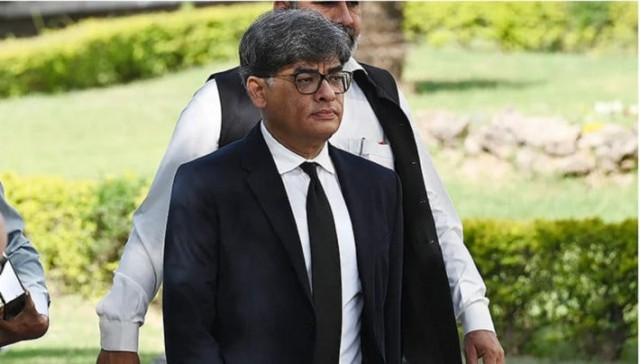Resignations have set the stage, dissent has begun: Khokar on Justices Mansoor, Minallah's resignations
Both judges wrote a letter to CJP Yahya Afridi, requesting him to convene full court meeting before resigning

Some key legal experts have described the resignations of Justice Syed Mansoor Ali Shah and Justice Athar Minallah — who were known for their progressive interpretation of the Constitution and their advocacy for fundamental rights and civil liberties — as a great national loss.
"The Supreme Court has been destroyed with connivance from within. The nation and the people mourn this tragedy. We have fallen into this abyss. It will take years before we come out of it," said former attorney general for Pakistan Khalid Jawed Khan.
Former additional attorney general Tariq Mahmood Khokhar said the resignations represent the triumph of principles and conscience over expedience. "It is a case of schadenfreude: the revenge of the independent judges on the extra-constitutionalists," he remarked.
Khokhar said the grave questions of the day will not be decided by writing letters or exchanging banter. It is beyond time that the judges came out before they were ousted ignominiously. He said the resignations have set the stage — dissent has begun.
"It will reinvigorate and embrace all tiers of the judiciary, the legal fraternity, and civil society. It is futile to expect change from within the institution. Past experience is against it.
"The structural damage is too deep to permit any meaningful reform. On the contrary, there has been a steady erosion of the judicial institution — enhanced control, enhanced submission, and enhanced replacement — in the name of reform," said Khokhar.
Both Justice Shah and Justice Minallah remained consistent in their opinions on issues relating to civil liberties, democracy, women's rights, and minorities. However, it is also a fact that political leaders' views regarding them have changed over time.
When they granted relief to PML-N leaders against the will of the "powerful circles", PTI supporters were angered. Later, when both judges held that the PTI was entitled to reserved seats after the general election, criticism against them began from the PML-N side.
As a Islamabad High Court judge, Justice Minallah granted relief to journalists and political leaders during the PTI rule.
When he gave relief to Nawaz Sharif and Maryam Nawaz in the Avenfield case, he faced ruthless criticism from PTI workers on social media, and even some Supreme Court judges were annoyed with him.
Both Justice Shah and Justice Minallah were not in the good books of former chief justice Mian Saqib Nisar. Justice Syed Mansoor Ali Shah was among the Supreme Court judges who saved Justice Qazi Faez Isa from removal.
Their elevation to the apex court also has an interesting background.
As chief justice of the Lahore High Court, Justice Shah initiated judicial reforms in the Punjab judiciary. A majority of lawyers were unhappy with him. Eventually, former chief justice Mian Saqib Nisar recommended him for elevation to the Supreme Court in January 2018.
When Justice Minallah, as the Islamabad High Court (IHC) chief justice, began granting relief to PTI leaders during the PDM government, the "powerful circles" managed his elevation to the Supreme Court.
However, Athar Minallah's most significant contribution to the justice system was the appointment of independent judges to the IHC.
When both judges opposed the Supreme Court's suo motu proceedings in the 90-day election case, they faced intense criticism from PTI supporters.
Later, when the PTI was denied a level playing field in the February 8 election, both judges directed the Election Commission of Pakistan (ECP) to redress the party's grievances. They also granted bail to Imran Khan and Shah Mahmood Qureshi in the cypher case.
Both judges were aligned with former CJP Qazi Faez Isa during his tenure.
Ex-CJP Isa was viewed as anti-PTI, and the government exploited that perception. On the other hand, Shah and Minallah expected CJP Isa to remain neutral in the clash between the security establishment and the PTI.
When six IHC judges wrote a letter protesting interference by intelligence agencies in judicial affairs, CJP Isa was reportedly upset — yet Justice Minallah stood by them.
The present government became annoyed with Justices Shah and Justice Minallah in the reserved seats case.
Both judges were part of the three-judge bench that had suspended the ECP's notification regarding the distribution of reserved seats among other political parties.
It is learnt that former CJP Isa was unhappy with that order. Eventually, a full court was constituted to hear the reserved seats case.
Despite all pressures, the majority judgment — led by Justice Syed Mansoor Ali Shah — held that the PTI was entitled to reserved seats after the February 8 election. The court directed the ECP to allocate 78 reserved seats in the national and provincial assemblies to the PTI.
However, the ECP did not implement the judgment.
This judgment in the reserved seats case became the main cause of the government's anger against Justice Shah and Justice Minallah.
After the passage of the 26th Constitutional Amendment, the executive did not appoint Justice Shah as the chief justice of Pakistan. Justice Yahya Afridi became the new CJP.
CJP Afridi, Justice Shah, and Justice Minallah were once partners in a legal firm before their elevation to the bench. However, their relationship reportedly deteriorated during CJP Afridi's tenure.
The relationship between them became tense when CJP Afridi did not allow Justice Shah to travel abroad. Likewise, a sub judice case was withdrawn from the bench headed by him. Despite Shah's request, a constitutional bench did not decide the 26th Constitutional Amendment case.
The over 50-year-long relationship between Justice Afridi and Justice Minallah was affected after the transfer of judges from various high courts to the Islamabad High Court (IHC). Justice Minallah had not expected that the CJP would consent to these transfers.
Later, both judges wrote a letter to CJP Afridi, requesting him to convene a full court meeting to discuss the proposed 27th Amendment. However, no meeting was called. Finally, both decided to tender their resignations with heavy hearts.




















COMMENTS
Comments are moderated and generally will be posted if they are on-topic and not abusive.
For more information, please see our Comments FAQ